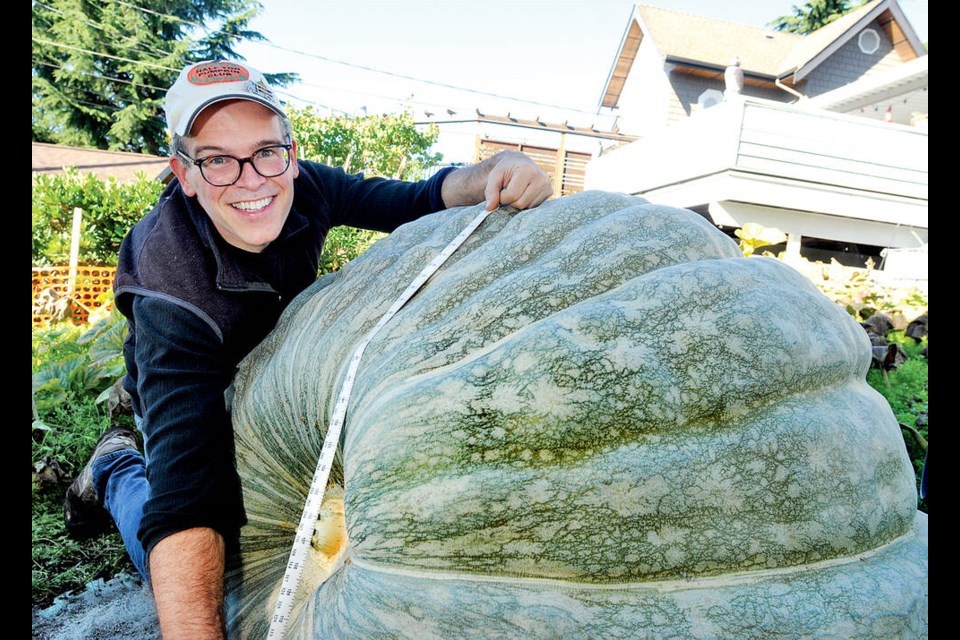Walking through Jeff Pelletier’s garden plays with one’s sense of scale. The fruits and vegetables are familiar shape but they’re all frankly gargantuan in size.
The North �鶹��ýӳ��gardener is already a giant in Great Pumpkin Commonwealth, the governing body in the world competitive pumpkin growing, but he is now in the running to receive the title of World Master Gardener, an annual award that’s among the toughest for horticulturalists to get their gardening gloves on.
Rather than competing to have the greatest Great Pumpkin, the event includes up to eight vegetables – giant pumpkin, giant squash, field pumpkin, long gourd, marrow, watermelon, bushel gourd and tomato. Contestants must provide at least five from the list, which are then awarded decathlon-style points based on numerous criteria.
Beyond the bragging rights that are commensurate with the size of the fruit and veg, the winner also gets a trophy that includes blown-glass miniatures of their prize-winning produce.
“They only give one worldwide,” Pelletier said. “It’s not the easiest thing to do.”
For a shot at the title, a few things need to be just right. It starts with the seed.
“Genetics is what you need. You need to be able to grow big things,” he said.
Pelletier secured some of his seeds from a woman in Washington State who is the only person in the world to have been named World Master Gardener two years in a row. Her seeds sell for as much as $750 a piece but Pelletier bartered for one of his custom quilts, which he sews in his spare time.
The hot, dry summer provided good growing conditions, and none of this year’s contenders fell victim to pests, thanks in part to Bert or Bart (Pelletier isn’t sure which), the neighbourhood cat who patrols the perimeter of the garden.
It may also help that Pelletier clearly has a relationship with the plants in his garden, including giving them oddly appropriate names. Two of the orange pumpkins are Garfield and Heathcliff. The long gourd is Gumby. His field pumpkin’s seed came from Austria, so it’s been named Arnold after an equally muscular Austrian. Because of its “green monster” status, the giant squash is named Fenway.
He uses a garden gnome as a point of reference to see how fast the giant squash is growing. The giant dwarfs the gnome.
This morning (oct. 7), Pelletier will harvest his botanical behemoths and take them to the official Great Pumpkin Commonwealth weigh-in and measuring at Kraus Berry Farm in Langley.
His long gourd is easily a threat to be the biggest ever grown in B.C. It quickly became too tall for the trellis he was growing it from, so Pelletier had to dig a trench more than a metre deep into his garden, giving it room to properly stretch out.
The results of more than 800 competitions being held around the world will be compiled and a winner named in November.
“My goal this year was just to get points on the leaderboard. If I place well, it’s a bonus fully well knowing what the competition is,” he said.
While it is a growing sport (pun intended), Pelletier said a lot of B.C.’s top cultivators are lured south of the border where there are bigger pots of prize money to be won. Pelletier has been seeking out sponsors who want to attach their brands to the growing giants in hopes of making the B.C. field more attractive.
Once the competition is over, the champions will go in their separate directions. Pelletier is donating the giant pumpkin and squash to be displayed at Kraus Berry Farm. Pelletier has plans to turn his bushel gourd into a drum for Winter Harp, the medieval Christmas music ensemble he tours with as a flutist. Some of the other gourds will become pig slop. His giant tomato is destined for a more dignified end as a caprese salad.
While some people use their green thumbs to make flowers bloom and others simply love to grow their own food, Pelletier said he’s drawn to the giants because they never fail to astonish and delight anyone who sees them.
“The long gourd does six to 12 inches a day. Giant pumpkins and squash can do 40 to 50 pounds a day. You really see a completely different plant when you come home from work,” he said. “It’s like there’s something magical about these things and that’s the payoff at the end of the year – to see how much joy they bring.”


